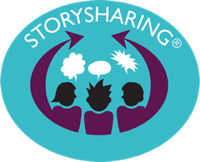Most interventions with narrative are based on models developed for people who have verbal skills. They prioritise the ability to tell a story independently and with coherent structure and they tend to disregard all the nonverbal aspects But in fact there are many different ways to tell stories, in different cultures and at different stages of our lives.
Storysharing® draws on research into small stories told in conversation (Bamberg, Norrick, Ochs & Capps), “high point” stories where nonverbal aspects are key (Labov), poetic patterned structure in storytelling (Hymes, Blommaert), and early narrative development (Ellis, Miller & Sperry, Scollon, Trevarthen, McCabe). Understanding these theories helps us to develop secure foundations for our practice and to develop new ideas.
Bamberg, M. and Georgapoulou, A., 2008, Small stories as a new perspective in narrative and identity analysis. Text & Talk – An Interdisciplinary Journal of Language, Discourse Communication Studies, 28, 377–396.
Blommaert, J., 2006, Applied ethnopoetics. Narrative Inquiry, 16, 181–190.
Ellis, L. (2007) The narrative matrix and wordless narrations: A research note. Augmentative and Alternative Communication, 23,113-125.
Hymes, D. (1998) When is oral narrative poetry? Generative form and its pragmatic conditions. Pragmatics 8:4.475-500
Labov, W. & Waletzky, J. (1976) Narrative analysis: oral versions of personal experience. In: Essays on the Verbal and Visual Arts. (ed. J. Helm), pp. 12-44. University of Washington Press, Seattle.
McCabe, A. (1997). Developmental and cross-cultural aspects of children’s narration. In M. Bamberg (Ed.), Narrative development (pp. 137-174). London; New Jersey: LEA.
Miller, P. J. & Sperry, L.L. (1988) Early Talk about the Past: the Origins of Conversational Stories of Personal Experience.. Journal of Child Language, 15, pp. 293–315.
Norrick, N. 2000, Conversational Narrative: Storytelling in Everyday Life . Amsterdam/Philadelphia: John Benjamin.
Ochs, E. & Capps, L (2001) Living narrative: creating lives in everyday storytelling. Harvard University Press, Cambridge, MA.
Scollon, R. (1973) A Real Early Stage: An Unzippered Condensation of a Dissertation on Child Language. Working Papers in Linguistics, Vol. 5, No. 6.
Trevarthen, C. (2007). https://ddpnetwork.org/backend/wp-content/uploads/2014/02/Colwyn-Trevarthen-Born-For-Art-and-the-Joyful-Companionship.pdf
